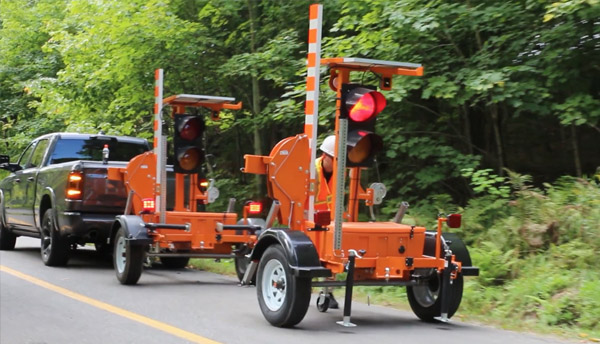
Boosting Work Zone Safety with AFADs: Smart, Efficient, and Protective
Work zones are some of the most dangerous environments for both drivers and road workers. Every year, thousands of crashes occur in construction zones, with distracted driving and limited visibility often to blame. That’s why agencies across the country are turning to Automated Flagger Assistance Devices (AFADs) — an innovation that combines technology, safety, and efficiency.
At Transportation Solutions & Lighting (TS&L), we provide state-of-the-art portable traffic signals and AFAD systems designed to protect workers, reduce risks, and keep traffic flowing smoothly.
What Are AFADs?
AFADs (Automated Flagger Assistance Devices) are portable, remotely operated traffic control systems designed to take human flaggers out of harm’s way. Instead of standing in an active traffic lane with a STOP/SLOW paddle, a trained flagger can operate the AFAD remotely, often from a safe location inside a work truck or behind a barrier.
There are two common types of AFADs:
Both types are fully recognized in the Manual on Uniform Traffic Control Devices (MUTCD) and are increasingly being adopted by DOTs and contractors nationwide.
Why AFADs Matter for Work Zone Safety
AFADs aren’t just about convenience — they save lives.
At a time when roadway fatalities and work zone crashes are rising, AFADs provide a much-needed layer of protection and consistency.
Regulatory Standards and Best Practices
AFADs are covered under MUTCD Section 6E.04 and must meet specific requirements for deployment. Here are key points:
In short: AFADs are safe, compliant, and effective — but they must be deployed correctly.
Benefits of AFADs for Contractors and Agencies
1. Enhanced Safety
The number one reason to use AFADs is worker safety. Instead of standing in traffic, your crew can control the system from a safe location.
2. Cost Savings
By reducing the number of on-site flaggers required, AFADs can lower labor costs — while still meeting safety standards.
3. Improved Traffic Flow
Unlike human flaggers, AFADs provide consistent, predictable signaling to drivers. That means less confusion, smoother traffic, and fewer delays.
4. Flexibility
Modern AFADs are solar-powered and trailer-mounted, allowing for quick setup, relocation, and 24/7 operation.
5. Public Trust
When drivers see high-visibility AFADs with LED lights, gate arms, and flashing signals, compliance improves. This directly reduces the chance of crashes in work zones.
AFAD Use Cases in the Southeast
Here in the Southeast, AFADs are increasingly deployed for:
For DOTs, counties, and contractors across Florida, Georgia, Alabama, Tennessee, and beyond, AFADs are proving to be one of the most effective tools for balancing safety and efficiency.
TS&L’s AFAD and Portable Traffic Signal Solutions
At TS&L, we supply portable traffic signals and AFADs that meet the highest industry standards. Our solutions include:
We know contractors and agencies can’t afford delays. That’s why TS&L guarantees responsive service, custom quotes within 15 minutes, and on-site support when you need it most.
Combining AFADs with Other Safety Solutions
AFADs are most effective when integrated with other safety systems. TS&L helps clients design comprehensive work zone safety plans that include:
This integrated approach gives contractors and agencies confidence that every work zone is as safe as possible.
Final Thoughts
Automated Flagger Assistance Devices are no longer “new” technology — they are quickly becoming the industry standard for short-term lane closures and work zones. By protecting flaggers, improving driver compliance, and streamlining operations, AFADs are transforming roadway safety.
At TS&L, we are proud to deliver AFAD and portable traffic signal systems that help our partners keep crews safe and projects on schedule.
👉 Ready to modernize your work zone safety? Visit our Portable Traffic Signals page or contact us today for expert guidance and immediate support.
Revolutionized Traffic Management and Service of Safety Solutions in the United States